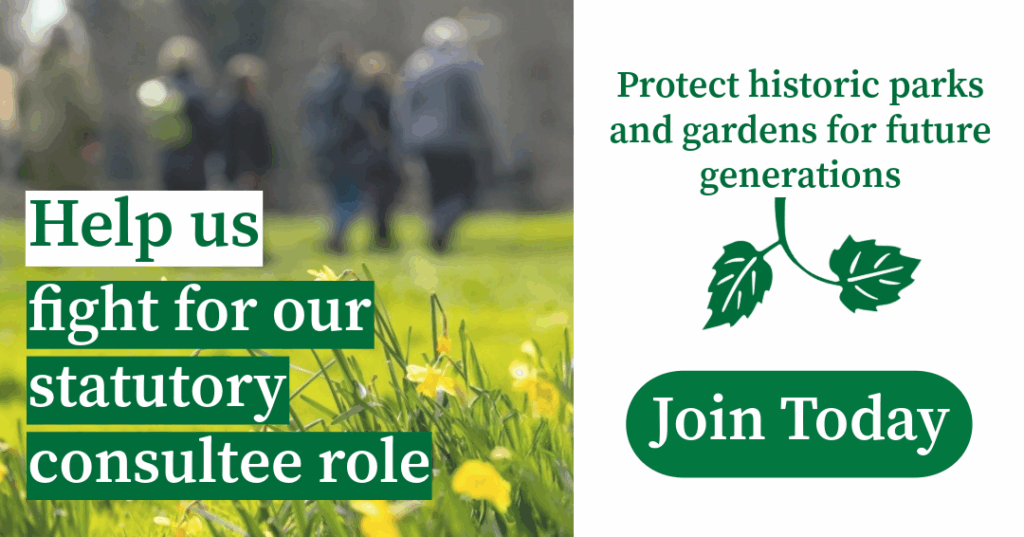
Last updated 14th January 2026
The Government recently launched a consultation including the removal of the Gardens Trust as a statutory consultee. This closed on 13th January and we thank everyone who responded and who continues to support us.
We will update everyone once the Government has announced its conclusions.
We robustly contest the proposal to remove the statutory consultee role, and disagree that it would improve the planning system. Instead, precious parks and gardens, hard won over many centuries, would be lost to communities both now and in future. We are passionate about the role that the UK’s world-famous historic parks and gardens can play in supporting positive economic growth and healthy cohesive societies, and eager to continue helping this in our role as statutory consultee.
The Gardens Trust response includes:
- Emphasising that the statutory consultation requirement is an important provision within the limited protections that registered parks and gardens have. Removing that is directly damaging, by reducing specialist input to the consideration of planning proposals and indirectly damaging, by signalling that parks and gardens are being ‘downgraded’ as heritage assets.
- Grave concern for the future of Grade II registered parks and gardens (64.7% of all 1700 registered parks and gardens).
- Contesting the proposal to notify rather than consult the Gardens Trust. This misguided and clumsy attempt to align registered parks and gardens with listed buildings instead places them with lower protection because listed buildings are subject to greater protection, including:
- Statutory duties for local planning authorities to have special regard to the desirability of preserving the listed building or its setting in the consideration of applications for both listed building consent and planning permission
- A dedicated consent regime: listed building consent is required for works which would affect the character of a listed building
- Identification of failure to obtain listed building consent where needed as a criminal offence.
- Contesting the proposal to notify the Gardens Trust only on applications within the registered boundary, thus removing protection for the setting of parks and gardens, which can be key to the significance of sites. You can download a Setting Q&A above.
- Local planning authorities (LPAs) do not have the expertise to handle park and garden casework without guaranteed specialist input. The cost of all local planning authorities having to deliver the service currently provided by the Gardens Trust themselves is estimated at £3,692,846 per annum. (In 2024/25, the Gardens Trust received a grant of £43,963 from the Department of Culture, Media and Sport to deliver its statutory consultee role.)
- The disparity in the protection of registered parks and gardens compared to listed buildings (both of which heritage assets are statutory designations, and of ‘special interest’) could be addressed in part by the commencement of section. 102 of the Levelling-up and Regeneration Act 2023. This would introduce a statutory duty to have special regard to the desirability of preserving or enhancing registered parks or gardens or their setting. This is noted as a possibility in the consultation document and is strongly sought by the Gardens Trust.
Thank you to those of your who submitted a response. Your views will be important, and it was vitally necessary that we showed the Government how many people care about this issue. We also have a Q&A around our statutory consultee work which can be downloaded above.
If you have a copy of your response, please could you send this to enquiries@thegardenstrust.org
You can continue to support us by:
- Sharing your support for us on social – you can follow and tag us @thegardenstrust on LinkedIn, X, Facebook, Instagram and TikTok.
- Writing to your MP, highlighting our response, giving your thoughts, and asking that they proactively ensure that the Government pays due regard to the consultation evidence and responses in making its decision. Advice and tools for writing to your MP can be found here.
- Donating to the Fighting Fund, in order to help with the challenges ahead.
About the Gardens Trust
The Gardens Trust is the only national organisation exclusively focused on historic designed landscapes, commonly known as ‘historic parks and gardens’. A charity, the Gardens Trust represents and supports the 35 local volunteer County Garden Trusts in England and works with related bodies across the UK. We work closely with others across the sector to maximise our contribution – you can see examples of those we work with here.
The Gardens Trust as a statutory consultee
As a statutory consultee, local planning authorities must consult the Gardens Trust in relation to all planning applications that may affect historic designed landscapes on the statutory Register of Parks and Gardens of Special Historic Interest in England. The Gardens Trust is the only consultee for sites on the Register at all Grades (Grades I, II* and II). Like all other statutory consultees, it’s responses are advisory only and are used to inform the local planning authorities’ decision-making.
In 2024-25 the Gardens Trust made 1289 planning consultation responses. 372 of the responses were bespoke, detailed responses of advice, with no objection. Only 85 of the responses were objections, and 16 of these were procedural because the consultation did not include the required information. Objections formed only 6.6% of our responses and were made only when vital. Where housing development is proposed, the Gardens Trust advises on impacts and harm and possible mitigations. In 2024-25 our objections related to only 1135 proposed new dwellings.
Cost of the Gardens Trust’s contribution to the planning system
The cost of the Gardens Trust’s statutory consultee role to the taxpayer is currently £43,963. If it did not carry out this work, the cost to local planning authorities in plugging the gap could be over £3million if using staff, or almost £8million if using consultants to address an in-house shortage of expertise.
The impact of removing the Gardens Trust’s statutory consultee role
There is no other body able to offer dedicated and expert advice to local planning authorities on planning applications that may affect historic parks and gardens. Local planning authorities do not hold this knowledge themselves and if they must make planning decisions in a vacuum of information about the impact on parks and gardens then the result is likely to be poor quality development and missed opportunities to make the most of the nation’s readymade green infrastructure, an irreplaceable resource. The loss of the statutory consultee role would most particularly leave Grade II Registered Parks and Gardens in a very precarious state as the Gardens Trust is the only consultee for those sites. Grade II sites account for 65% of the Register and are often the more accessible sites to the general public and, through their familiarity, often the more vulnerable. We are deeply concerned about this potential loss of these unique cultural assets many accessible to all.
Historic parks and gardens have a role to play in:
- Growing the economy, as historic parks and gardens support well-designed development with ready-made access to pre-existing greenspace. They also add hugely to the UK’s tourism economy, being one of the biggest drivers in this field, nationally and internationally.
- Help to ameliorate the impacts of climate change.
- Support nature recovery, particularly in our cities, where , established older landscapes can provide established complex habitats.
- Public parks play an important role in social cohesion by offering space for people to come together and build communities, as well as offering places for wellbeing, play and recreation for all. Public parks were created to help civilise the rapidly expanding cities in the 19th century1920s and post war period and will be critical to the success of 21century urban expansion and concentration.
- Ensuring that the NHS is fit for the future, because parks help reduce demand on the NHS by offering free-to-access places to exercise and enjoy fresh air, critical for health and wellbeing.
- Nurturing opportunity for all, because not only does an active parks and gardens sector support inclusive access to leisure but it also offers a range of accessible career pathways.
You can read more about the role of historic parks and gardens in the 21st century in our recent report Harnessing Parks and Gardens in the 21st Century: How Historic Landscapes can Support our Today and Tomorrow.


